Related Research Articles
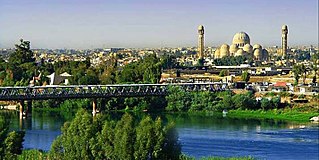
Nineveh or Ninawa Governorate is a governorate in northern Iraq. It has an area of 37,323 km2 (14,410 sq mi) and an estimated population of 2,453,000 people as of 2003. Its largest city and provincial capital is Mosul, which lies across the Tigris river from the ruins of ancient Nineveh. Before 1976, it was called Mosul Province and included the present-day Dohuk Governorate. The second largest city is Tal Afar, which has an almost exclusively Turkmen population.

Ankawa is a suburb of Erbil in the Kurdistan Region of Iraq. It is located 8 kilometres (5 mi) northwest of downtown Erbil. The suburb is predominantly populated by Assyrians, most of whom adhere to the Chaldean Catholic Church.

Iraqi Assyrians are an ethnic and linguistic minority group, indigenous to Upper Mesopotamia. Assyrians in Iraq are those Assyrians still residing in the country of Iraq, and those in the Assyrian diaspora who are of Iraqi-Assyrian heritage. They share a common history and ethnic identity, rooted in shared linguistic, cultural and religious traditions, with Assyrians in Iran, Assyrians in Turkey and Assyrians in Syria, as well as with the Assyrian diaspora. Assyrian diaspora in Detroit, Areas with large expat populations include Chicago and Sydney.
Minorities in Iraq include various ethnic and religious groups.
Religion in Iraq dates back to Ancient Mesopotamia, particularly Sumer, Akkad, Assyria and Babylonia between circa 3500 BC and 400 AD, after which they largely gave way to Syriac Christianity and later to Islam.
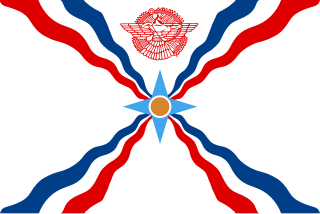
The Assyrian homeland, Assyria, refers to the homeland of the Assyrian people within which Assyrian civilisation developed, located in their indigenous Upper Mesopotamia. The territory that forms the Assyrian homeland is, similarly to the rest of Mesopotamia, currently divided between present-day Iraq, Turkey, Iran and Syria. In Iran, the Urmia Plain forms a thin margin of the ancestral Assyrian homeland in the north-west, and the only section of the Assyrian homeland beyond the Mesopotamian region. The majority of Assyrians in Iran currently reside in the capital city, Tehran.

Nineveh Plains is a region in Nineveh Governorate in Iraq, to the north and east of the city Mosul. Control over the region is contested between Iraqi security forces, KRG security forces, Assyrian security forces, Babylon Brigade and the Shabak Militia.

The Christians of Iraq are considered to be one of the oldest continuous Christian communities in the world.

Christianity, which originated in the Middle East during the 1st century AD, is a significant minority religion within the region, characterized by the diversity of its beliefs and traditions, compared to Christianity in other parts of the Old World. Christians now make up approximately 5% of the Middle Eastern population, down from 13% in the early 20th century. Cyprus is the only Christian majority country in the Middle East, with Christians forming between 76% and 78% of the country's total population, most of them adhering to Eastern Orthodox Christianity. Lebanon has the second highest proportion of Christians in the Middle East, around 40%, predominantly Maronites. Egypt has the next largest proportion of Christians, at around 10% of its total population. Copts, numbering around 10 million, constitute the single largest Christian community in the Middle East.
Religion in Syria refers to the range of religions practiced by the citizens of Syria. Historically, the region has been a mosaic of diverse faiths with a range of different sects within each of these religious communities.

Bashiqa is a town situated at the heart of the Nineveh plain, between Mosul and Sheikhan, on the edges of Mount Maqlub.
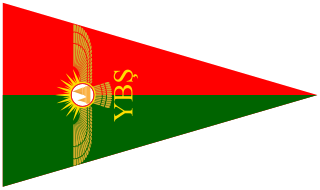
The Sinjar Resistance Units is a Yazidi militia formed in Iraq in 2007 to protect Yazidis in Iraq in the wake of attacks by Sunni Islamist insurgents. It is the second largest Yazidi militia, after the Êzîdxan Protection Force (HPÊ). However, it is much more active than the HPÊ in fighting against the Islamic State of Iraq and the Levant (ISIL).

The Sinjar District or the Shingal District is a district of the Nineveh Governorate. The district seat is the town of Sinjar. The district has two subdistricts, al-Shemal and al-Qayrawan. The district is one of two major population centers for Yazidis, the other being Shekhan District.

The main religions that exist or historically existed in Kurdistan are as follows: Sunni Islam, Shia Islam, Christianity, Zoroastrianism, Yarsanism, Yazidism, Alevism and Judaism. Overall today, Sunni Islam is the most adhered to religion in Kurdistan.
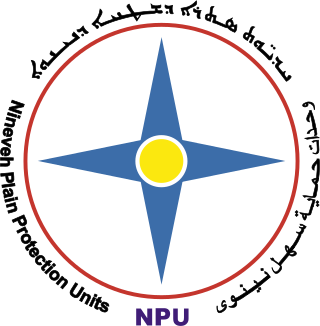
The Nineveh Plain Protection Units or NPU is an Assyrian military organization that was formed in late 2014, largely but not exclusively by Assyrians in Iraq to defend themselves against Islamic State of Iraq and the Levant. The Nineveh Plains is a region where Assyrians originate from and have lived there for thousands of years.

In the de facto autonomous Rojava region of northern Syria, the first local elections took place on Friday, 13 March 2015. The municipal governments in the three predominantly Kurdish cantons Cizîrê, Kobanî and Afrin were to be elected.
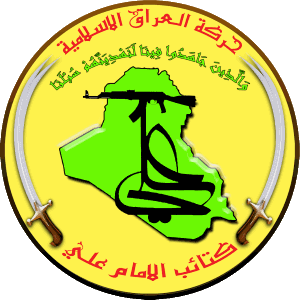
Kata'ib al-Imam Ali, also known as the Imam Ali Battalions, are the armed wing of the Islamic Movement of Iraq and serve as part of the umbrella organization "Popular Mobilization Forces". Kata'ib al-Imam Ali is prominently involved in the Iraqi Civil War, fighting against the Islamic State of Iraq and the Levant (ISIL).

The November Sinjar offensive was a combination of operations of Kurdish Peshmerga, PKK, and Yezidi Kurd militias in November 2015, to recapture the city of Sinjar from the Islamic State of Iraq and the Levant. It resulted in a decisive victory for the Kurdish forces, who expelled the ISIL militants from Sinjar and regained control of Highway 47, which until then had served as the major supply route between the ISIL strongholds of Raqqa and Mosul.
A number of Christian militias in Iraq and Syria have been formed since the start of the Syrian Civil War and in the 2013-2017 War. The militias are composed of fighters mainly from the Assyrian but also include Arab and Armenian Christian communities in Syria, and Assyrians in Iraq have formed militias in the north to protect Assyrian communities, towns and villages in the Assyrian homeland and Nineveh Plains. Some foreign Christian fighters from the Western world have also joined these militias.

The persecution of Yazidis has been ongoing since at least 637 CE. Yazidis are an endogamous and mostly Kurmanji-speaking minority, indigenous to Kurdistan. The Yazidi religion is regarded as "devil-worship" by Muslims and Islamists. Yazidis have been persecuted by the surrounding Muslims since the medieval ages, most notably by Safavids, Ottomans, neighbouring Muslim Arab and Kurdish tribes and principalities. After the 2014 Sinjar massacre of thousands of Yazidis by ISIL, which started the ethnic, cultural, and religious genocide of the Yazidis in Iraq, Yazidis still face discrimination from the Iraqi government and the Kurdistan Regional Government.
References
- 1 2 3 4 5 6 US State Dept 2022 report
- 1 2 Freedom House website, retrieved 2023-08-08
- ↑ Open Doors website, retrieved 2023-08-08
- ↑ "داعش تعلن تأسيس دولة الخلافة وتسميتها "الدولة الإسلامية" فقط دون العراق والشام والبغدادي أميرها وتحذر "لا عذر لمن يتخلف عن البيعة". Arabic CNN. 29 June 2014. Retrieved 31 July 2014.
- ↑ "Isis rebels declare 'Islamic state' in Iraq and Syria". BBC News. 30 June 2014. Retrieved 30 June 2014.
- ↑ "Islamic State". Australian National Security. National Security Committee. Archived from the original on September 24, 2014. Retrieved November 1, 2021.
- ↑ Neffinger, Veronica. "Christians Return to Iraq and Reopen Churches". Christian Headlines. Archived from the original on November 29, 2016. Retrieved November 1, 2021.
- ↑ Domle, Khidir. "Assyrians accuse Kurdish authorities of discrimination". Kurdish Aspect. Archived from the original on November 6, 2006. Retrieved April 15, 2018.
- United States Bureau of Democracy, Human Rights and Labour. Iraq: International Religious Freedom Report 2007. This article incorporates text from this source, which is in the public domain.